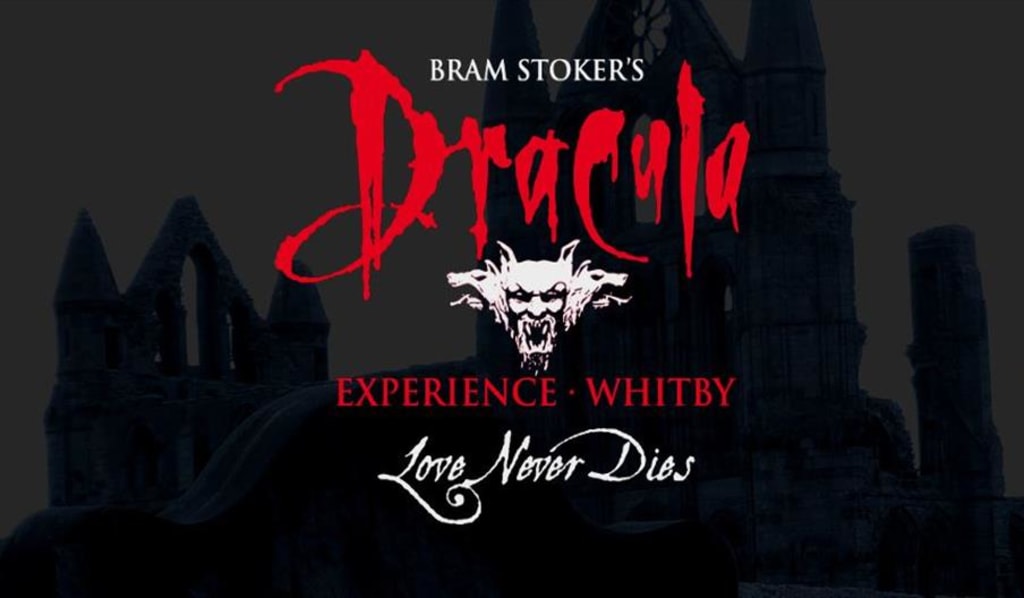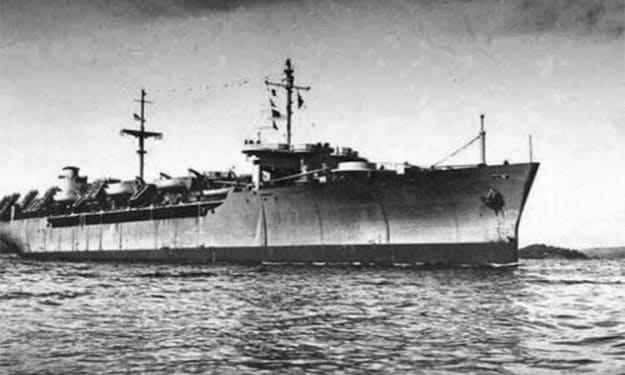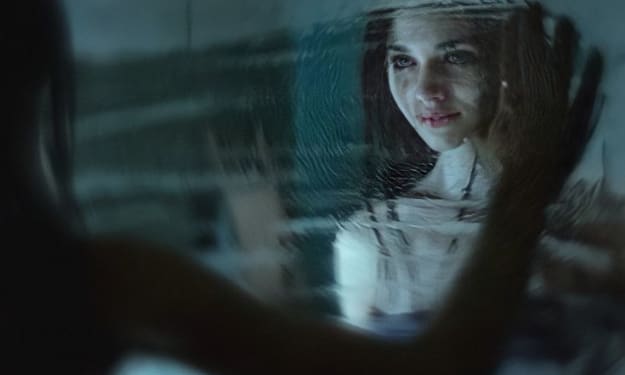Dracula chapter 7-8
Summary and Analysis Chapters 7-8

Summary
Utilizing the narrative device of a newspaper clipping (dated August 8th), the story of the landing of Count Dracula's ship is presented. The report indicates that the recent storm, one of the worst storms on record, was responsible for the shipwreck of a strange Russian vessel. The article also mentions several observations which indicate the vessel's strange method of navigation; we learn that observers feel that the captain had to be mad because in the midst of the storm the ship's sails were wholly unfurled.
Many people who witnessed the approach of the strange vessel were gathered on one of Whitby's piers to await the ship's arrival. By the light of a spotlight, witnesses noticed that "lashed to the helm was a corpse, with drooping head, which swung horribly to and fro" as the ship rocked. As the vessel violently ran aground, "an immense dog sprang up on deck from below," jumped from the ship, and ran off. Upon closer inspection, it was discovered that the man lashed to the wheel (the helm) had a crucifix clutched in his hand. According to a local doctor, the man had been dead for at least two days. Coast Guard officials discovered a bottle in the dead man's pocket, carefully sealed, which contained a roll of paper.
In a newspaper article the next day, it is revealed that the ship, a schooner, was a Russian vessel, one from Varna, called the Demeter. The only cargo on board was a "ballast of silver sand" and "a number of great wooden boxes filled with mould." It is revealed that the cargo was consigned to a Whitby solicitor, Mr. S. F. Billington, who has claimed the boxes. The bizarre circumstances of the ship's arrival have been the talk about town for the last few days, and there has also been some interest as to the whereabouts of the big dog which jumped ashore on the first night. The dog has disappeared, and some citizens are worried that the dog may be dangerous. Reportedly, a half-breed mastiff was found dead, its throat torn out and its belly split open.
The narrative continues with excerpts from the Demeter's log. The log begins on the 6th of July, which would be a week after Jonathan Harker's last entry in his journal. According to the log entries, all is calm aboard the ship for several days. On the 16th of July, however, one crew member is found missing, and the log indicates that all the sailors are downcast and anxious. The next day, the 17th of July, a sailor reports seeing a "tall, thin man, who was not like any of the crew, come up the companionway, and go along the deck forward and disappear." Yet no one, upon inspection of the ship, is to be found.
Five days later, on the 22nd of July, the ship passes Gibraltar and sails out through the Straits with apparently no further problems. Two days later, however, another man is reported lost, and the remaining men grow panicky and frightened. Five days later, another sailor is missing. On the 30th of July, only the captain, his mate, and two crew members are left. On the 2nd of August, another crew member disappears. At midnight on the next night, the remaining deck hand disappears, and the captain and the mate are the only remaining men aboard. The captain reports that the mate is haggard and close to madness. In a panic, the mate, a Roumanian, hisses, "It is here." The mate thinks that "it" is in the hold, perhaps "in one of the boxes." The mate descends into the hold, only to come flying from the hold moments later, screaming in terror, telling the captain, "He is there. I know the secret now." In despair, the mate throws himself overboard, preferring drowning to a confrontation with "the thing." Since the captain feels that it is his duty to remain with the ship, he vows to tie his hands to the wheel and take the ship to port. At this point, the log ends.
The log of the Demeter stirs up a great deal of controversy, and most of the townsfolk regard the captain as a hero. The reporter ends his narration by stating that the great dog has not yet been found.
The narrative shifts then to Mina's journal (August 8th), the day of the great storm. Lucy is still sleepwalking, and Mina has yet to hear from Jonathan.
On the 10th of August, Mina indicates that the burial of the sea captain was on this day and that Lucy is very upset about the events of the last few days. In a shocking revelation, we learn that old Mr. Swales was found dead this morning, near the graveyard, at the seat where Lucy and Mina would often visit with him. According to the doctor, the old man must have "fallen back in the seat in some sort of fright" because his neck was broken.
Mina's journal for the 10th of August concludes with the observation that Lucy is happy and seems better in body and in spirit than she has for quite some time. The next entry is a few hours later; at 3 A.M., Mina awakened with a horrible sense of fear and discovered that Lucy's bed was empty. After satisfying herself that Lucy was nowhere to be found inside the house, she threw a heavy shawl about herself and headed outdoors to search for Lucy. While searching, it occurred to Mina that Lucy might have gone to their favorite place, the seat on the hill where old Mr. Swales was found. She looked towards the hill where the seat was located and, under the light of a "beautiful moon," she saw on the seat a half-reclining figure, "snowy white." Above the figure, "something dark" was bending over the reclining figure. Mina raced to the spot. When she approached the seat, Mina saw something "long and black" bent over the half reclining figure. Mina called to Lucy in fright, and "the thing raised a head." Mina could see "a white face and red, gleaming eyes." By the time Mina reached the seat, the moonlight was so brilliant that Mina could see that Lucy was alone. It appeared that Lucy was merely asleep, but her breathing was hesitant and coming in long, heavy gasps; then Lucy shuddered and covered her throat with her hand. Mina threw her shawl over Lucy to warm her, and Lucy pulled the shawl up about her neck as though she were cold. Mina accounts for the two puncture wounds in Lucy's throat as the result of pin pricks caused when Mina was trying to pin a shawl around Lucy's exposed neck. Mina then escorts Lucy back home and puts her back to bed. Just before falling asleep, Lucy begs Mina not to tell anyone of the incident.
That morning (August 11th) Lucy looks better to Mina than she has for weeks. Mina berates herself for wounding Lucy with the safety pin, for again she notices the two little red pin pricks on Lucy's neck, "and on the band of her nightdress was a drop of blood." Lucy casually laughs off Mina's concern. The rest of the day is spent happily, and Mina expects a restful night.
In her journal entry of the next day, however, Mina indicates that her expectations were wrong. Twice that night Mina discovered that Lucy was awake and trying to leave the room. Yet, the next morning, Lucy was, seemingly, the picture of health to Mina.
The 13th of August is a quiet day, yet that night Mina discovers Lucy sitting up in bed in a dazed sleep, "pointing to the window." Mina goes to the window, and in the brilliant moonlight she notices "a great bat" flitting about in circles. Evidently the bat is frightened by the sudden appearance of Mina at the window and flies off.
The next day at sunset, Mina indicates that she and Lucy spent the day at a favorite spot on the East Cliff, and, at sunset, Lucy made a most unusual remark: "His red eyes again! They are just the same." At the moment when Lucy utters this phrase, Mina notices that Lucy's eyes are directed towards their favorite seat, "whereon was a dark figure seated alone." To Mina, the stranger's eyes appeared for a moment "like burning flames." Later, the two return home and say no more about the incident.
After seeing Lucy to bed that night, Mina decided to go for a short stroll. Coming home in the bright moonlight, she glanced up at their bedroom window and noticed Lucy's head leaning out. Mina thought that Lucy was looking for her, but she was not — Lucy did not even notice Mina. She appeared, in fact, to be fast asleep. Curiously, seated on the window sill next to her was something that looked like a "good sized bird." Running upstairs to the bedroom in a panic, Mina discovered that Lucy was now back in her bed — asleep, but holding her hand to her throat as if chilled. Mina chooses not to awaken her, yet she notices, much to her dismay, that Lucy looks pale and haggard. Mina attributes this to Lucy's fretting about something.
On the next day (15th of August), Mina notices that Lucy is "languid and tired" and that she slept later than normal. Mina receives a bit of unexpected and shocking news from Mrs. Westenra, Lucy's
mother. Mrs. Westenra's doctor has informed her that she has only a few months to live because of a heart condition.
Two days later, Mina is despondent. She has had no news from Jonathan yet, and Lucy seems to be growing weaker and weaker by the day. Mina cannot understand Lucy's decline, for she eats well and sleeps well and gets plenty of exercise. Yet at night, Mina has heard her awaken as if gasping for air, and just last night, she found Lucy leaning out of the open window again; Lucy was incredibly weak and her breath came with much difficulty. Inspecting Lucy's throat as she lay asleep, Mina noticed that the puncture wounds had not healed; if anything, they were larger than before and the edges were pale and faintly puckered. "They were like little white dots with red centers."
In a letter dated the 17th of August, Mr. S. F. Billington (to whom the boxes from the Demeter were consigned) orders the boxes to be delivered to Carfax, near Purfleet, in London.
Mina's journal (August 18th) records that Lucy is looking better and slept well the last night. Lucy seems to have come to terms with the night when she was found sleepwalking. Lucy spends most of her time thinking of her fiancé, Arthur. Lucy feels that the recent events are like a dream, yet she has a "vague memory of something long and dark with red eyes . . . and something very sweet and very bitter all around, sinking into deep green water." Her "soul seemed to go out from [her] body and float about in the air." She tells Mina there was suddenly "a sort of agonizing feeling." And then Mina woke her.
On the 19th of August, Mina receives news of Jonathan — he is in a hospital in Budapest. Mina intends to leave the next morning to go to Budapest to be with him; Jonathan apparently has been hospitalized because of Bram fever. In a letter from a Sister Agatha, Mina is warned that she should be prepared to spend some time at the hospital, for Jonathan's illness is very serious.
The narrative shifts then to Dr. Seward's diary. Renfield, it seems, has had a swift and drastic change in personality. He has periods of excitement, and he acts as if he were a caged animal. He had been respectful, but recently, he has become quite "haughty." He has told Seward that "the Master is at hand." Dr. Seward attributes Renfield's condition to a "religious mania." Renfield's pets (the spiders, flies, and sparrows) are no longer important to him. Later that night, Renfield escapes. Dr. Seward and several attendants follow Renfield to Carfax (the destination of the fifty boxes of earth belonging to Count Dracula). Following him onto the grounds, Seward finds Renfield "pressed close against the old iron-bound oak door of the chapel," apparently talking to someone. Renfield is apparently addressing someone whom he calls "Master"; Renfield seems to consider himself a slave. Dr. Seward and the attendants put a restraint on Renfield and return him to his cell. There, Renfield says that he "shall be patient, Master."
Analysis
Once again Stoker relies on clever stylistic devices to add verisimilitude to his story. By using newspaper clippings, the ship's log, the medical journal, excerpts from telegrams and diaries, he builds a cumulative picture of events as though they might really have happened and, thus, he gives greater credence to this improbable story.
The ship that was sighted at the end of Chapter 6 has turned out to be the ship which was carrying the loads of dirt from Count Dracula's estate, the cargo that Jonathan Harker saw being loaded on wagons in Transylvania. Apparently, Count Dracula himself is "residing" in one of these boxes. The storm, the howling dogs, and the mysterious disappearance of the sailors — all are symbolic of the approaching evil which is represented by Count Dracula. It is clear that Dracula is a harbinger of the natural catastrophes which are occurring. His evil presence is felt by old Mr. Swales, who at his advanced age cannot withstand the horrors represented by the arrival of Dracula and is found dead, murdered to make it seem as though he were killed accidentally. It can be assumed that the mysterious dog that came from the ship was Dracula himself in one of his guises, and that it was responsible for knocking the old man down and causing his death. Many supernatural things, like Mr. Swales' death, are never fully explained by Stoker, leaving all the events surrounded by an aura of superstition and mystery.
The calm Victorian life, filled with all of the amenities of life, is being penetrated by everything which Dracula represents, and the disruption is seen mainly in the manner in which he "penetrates" a young virgin's (Lucy's) neck, sucking both life and blood from her.
The illness of Arthur Holmwood's father (only slightly mentioned), as well as the approaching death of Lucy's mother, seem cabalistically linked to the approach and arrival of Count Dracula, and, thus, by the end of the novel we will see that both Lucy and her mother have become victims of the intruding spectre of horror. Dracula is more than just a vampire, more than just a satanic presence affecting only a few; he is also a symbol of total social disruption and chaos. If not stopped, he will destroy all of Victorian society. Count Dracula's appearance and his satanic presence — his black clothes, his fiery red eyes, and his pale features — are a total contrast to the winsome, innocent, and virginal presence of the two ladies (Lucy and Mina) who represent purity.
Once again, Stoker inverts the traditional Christian myth when Renfield anticipates and looks forward to the arrival of his "lord and master" in the person of Count Dracula. Stoker, in an interesting choice of phraseology, considers Renfield's behavior at Carfax as though Renfield is experiencing a "Real Presence," as though Dracula were the (perverted) Holy Ghost. The entire scene is a perversion of the Catholic communion, wherein the Real Presence of the Holy Ghost is present each time that the Eucharist is administered.
In terms of the narrative structure so far, we don't know why Count Dracula left Transylvania to come to England — rather than go somewhere else, or even why he had to leave his native country. However, in these chapters, we find out that Jonathan Harker did escape, but his method of escape will never be revealed to us; remember that when we last saw him, he was a prisoner in Dracula's castle, surrounded by wolves and supernatural beings. Yet suddenly, without explanation, he appears in Budapest, where he is cared for by nurses.
About the Creator
mohamed irfan
nothing to say like me





Comments
There are no comments for this story
Be the first to respond and start the conversation.